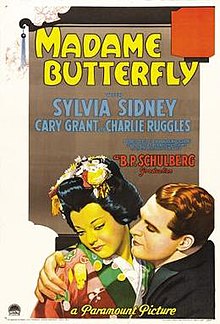Madame Butterfly (1932 film)
| Madame Butterfly | |
|---|---|

Movie poster
|
|
| Directed by | Marion Gering |
| Produced by | B. P. Schulberg |
| Written by |
David Belasco (play) John Luther Long (short-story) Josephine Lovett (screenplay) Joseph Moncure March (screenplay) |
| Starring |
Sylvia Sidney Cary Grant Charles Ruggles Irving Pichel |
| Music by | W. Franke Harling |
| Cinematography | David Abel |
| Distributed by | Paramount Pictures |
|
Release date
|
|
|
Running time
|
86 minutes |
| Country | United States |
| Language | English |
Madame Butterfly is a 1932 American Pre-Code Paramount dramatic film by Marion Gering. It is based on the play by David Belasco which is based on the story by John Luther Long, and is adapted by Josephine Lovett and Joseph Moncure March. It stars Cary Grant and Sylvia Sidney. Music is credited to W. Franke Harling (although much of it is an adaptation of Puccini's opera Madama Butterfly), cinematography by David Abel, art direction by Ward Ihnen. It premiered on December 30, 1932.
At Goro's Tea House, we are introduced to Cho-Cho San (Sylvia Sidney) who is bidding farewell to her mother and grandfather. She is about to undergo training as a geisha in exchange for money that will support her family. After the relatives leave, Goro introduces Prince Yamadori, a prospective husband, to Cho-Cho San. When Yamadori finds her withdrawn, Madame Goro explains that Cho-Cho San is high-born and is not yet used to the geisha life style.
Meanwhile, on board an American steamship due to arrive in Japan for several months' stay, Lieutenant Barton (Charles Ruggles) convinces his friend Lieutenant Ben F. Pinkerton (Cary Grant) that once they arrive to skip the American Counsul's party and plan to enjoy themselves instead. Pinkerton looks at a photograph of a blonde woman inscribed to him 'from Adelaide' and hides it in his clothing trunk.
Back at Goro's, Mrs. Goro prepares Cho-Cho San for another meeting with Yamadori by dressing her more elegantly. Meanwhile, Pinkerton and Barton enter Goro's, and are greeted by geishas. They are seated and watch a performance of dancing and music played by the geishas, and begin to become intimate with them. Goro interrupts so Pinkerton wanders to a different room and, through a screen, sees a dancing silhouette. Entering further, he discovers Cho-Cho San practicing her dancing. Despite Goro's admonishment, he is immediately enchanted with Cho-Cho San, who runs away to the garden in fear. Pinkerton catches up to her and they talk.
Yamadori comes to meet Cho-Cho San again. Goro pretends she is indisposed but a neighboring geisha reveals that she is with a naval officer. Infuriated, Yamadori vows never to set foot in Goro's house again. This makes Goro angry at Cho-Cho San, since Yamadori was Goro's best client. Goro threatens to shame Cho-Cho San's family because she has been disobedient. Pinkerton asks Goro to explain why he is so angry, and Goro tells him that Cho-Cho San was supposed to marry Yamadori. Barton takes Pinkerton aside and tells him that "marriage" to Japanese is just a formality: when husbands desert, the geishas can automatically be considered divorced. Realizing how easy the situation is, Pinkerton informs Goro of his intention to marry Cho-Cho San.
...
Wikipedia
